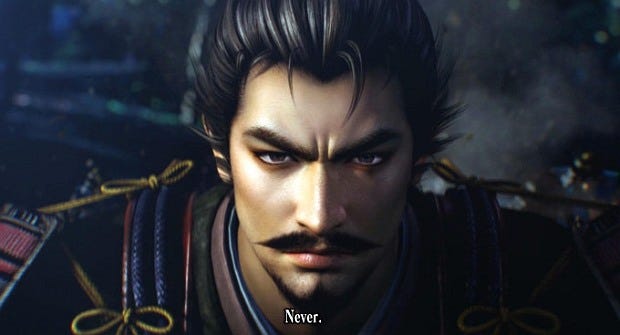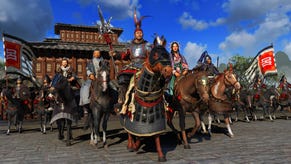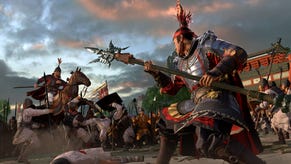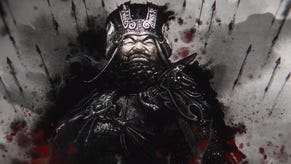Wot I Think: Nobunaga's Ambition Sphere Of Influence
Japan's equivalent of, er, Shogun: Total War
Love of history starts with a love of good stories. The complexity and doubt come later, when you have heard the same stories so many different ways that the veneer of the Great Men narrative starts peeling away from the foundations of messy, conflicting fact. But that love of a good story never really goes away.
Nobunaga's Ambition: Sphere of Influence [official site] succeeds or fails based on your willingness to hear, and take part in, just such a story. There's a storybook quality to this game that can prove disarming and captivating even as the game itself can sometimes be so repetitive and straightforward that at times it plays almost like a Facebook strategy game. Like its title character, who scarcely has time for anything but his plans for national unification, Nobunaga's Ambition has its gaze fixed on the great themes of its era: warfare, diplomacy, family, and betrayal. It's a little hazy on the details of economy, foreign policy, and tactics.
Set in the late Sengoku period, Nobunaga's Ambition: Sphere of Influence is at once a strategy game in which you try to lead one of many powerful Japanese clans to hegemony over the rest of the country, and an historical fiction in which larger than life characters (reimagined as the super-handsome, smoldering senpais that you dream might one day notice you) re-enact famous moments and bring to life some of the grandeur and tragedy of the age.
The presentation is charmingly retro, and will strike a nostalgic chord in anyone who played the classic Koei games from the 1980s and 90s, like Romance of the Three Kingdoms, Liberty or Death, or the old Nobunaga's Ambition games. Despite an interface that looks like it's still tuned for old consoles, Sphere of Influence works well with a mouse and has a surprisingly effective in-game tutorial and help menu that makes sense out of the slightly baffling iconography.
In keeping with that air of nostalgia, most of the cutscenes are nothing but text-dialogues featuring static backdrops and character portraits, and lots of lines that only say, "..." to make sure you know you're playing a Japanese game.
There are affecting moments here, however. We see a touching goodbye between the ruthless warlord Imagawa Yoshimoto and his chief advisor and mentor, the Buddhist monk Sessai Taigen. The old monk is retiring and near the end of his life. He knows he's going to hell for the things he did in life, but he tells Imagawa that it was all worth it.
"Then wait for me in hell," Yoshimoto replies, because by the time he's done doing what needs to be done to unify Japan, heaven will be closed to him as well.
On the other hand, given the fussiness and repetition of governing a clan in Nobunaga's Ambition, I wouldn't be too sure that Yoshimoto wasn't already there.
Governance, in Nobunaga's Ambition, is chiefly about constant attention to detail, and that is the game's biggest weakness. The period is one of Shakespearean drama, but from one month-long turn to another, you're clicking on all your settlements and checking on their development, looking at a long list of officers to see who is becoming disloyal, giving gifts to wavering subordinates, and making sure your diplomats are still plugging away and earning trust from other daimyo.
The cumulative effects of these decisions are significant, but they're needlessly granular. Fortunately, you can automate a lot of governance and, later, you'll have to turn territory over to subordinates, but the nuts-and-bolts details of rule just aren't that interesting. The economy is too forgiving, and your tools for managing it are too straightforward to allow for satisfying strategic dilemmas.
Yet I'd be lying if I said I didn't enjoy it. There is a pleasant boredom to this game. In each turn, you are watching your holdings grow and your capacity for action increase. The richer you get, the more options you have every turn. The arc that takes you through from being the lord of a small castle to a mighty warlord with armies fighting across half of Japan is undeniably satisfying.
The problems you face also get thornier. For one thing, you need lots of vassals and retainers to administer even a small territory. Every major construction project requires an overseer. So does every city. All diplomacy must be carried out by a different officer. Every army contingent needs a commander.
There's no shortage of candidates, but there is a severe shortage of people who are both capable and loyal. It doesn't take long before you're playing a shell game with yourself, moving useful but unreliable officers into positions where they can't do too much harm, and trying to find good loyalists for the really critical jobs. Unhappy characters can't be trusted, you see. Best case scenario, they'll be lured away by another clan. Worst case, they'll wait until they're in command of one of your armies and then they'll defect, or at least sit on their hands while enemy armies stroll past unmolested.
The downside here is that checking loyalty becomes incredibly tedious. Every few turns I was opening up my list of officers and checking to see who was wavering, who was halfway to treason, and who was reliable. Then it was just a matter of seeing who to get rid of, and who to buy-off with an official appointment or a shiny bauble. This is, in fact, the chief problem with this game. Most of the time there's a clear, straightforward solution to every problem that arises, with no real trade-offs. It's just a matter of marshalling the resources that will allow you to push a button and fix a problem.
What Nobunaga's Ambition does very well is create a sense of fleeting opportunity. It takes a lot of time and money to open the door to a major offensive. You have to have diplomats earn trust from other daimyo. You have to have your troops rested and replenished back at base. You need to make sure you will have enough soldiers to actually lay successful sieges, especially because you need large troop contingents to besiege particularly strong forts (since siege slots are limited, one contingent of 5000 men is far better at conducting a siege than five levies of 1000 men apiece). If you don't prepare well, your campaign can be set back by years.
Because nothing lasts in this game. Alliances are short-lived and fluid. When your troops march to the border of an enemy's lands in June, your adversary might be diplomatically isolated. When you invade in July, your enemy might have three powerful clans racing to their aid. Your soldiers themselves only have supplies for a few months before they must return to friendly territory to stock-up. Each time you request aid from an ally, you are consuming trust — their willingness to grant your requests — and will have to wait for your diplomats to do their work again if you want more help.
Creating these windows of opportunity is really where this game is won and lost. Who your allies are, what they can offer, and how many of your own troops you can put into the field is what matters here, not battlefield heroics. That's why the battle system ends up being such a dud. While the battles look nice enough, despite some crude unit animations, you barely have to maneuver your lines of troops across the simple landscapes. Armies just blast away with arrows until someone runs out of men, and even commander abilities don't seem to have a huge effect. I soon found myself leaving the battles alone, especially since the AI will usually squander its armies piecemeal anyway.
Ultimately, Nobunaga's Ambition: Sphere of Influence is a game that succeeds on the basis of its broad strokes. I enjoyed playing at being a daimyo, lining up my allies and officers before a major push into a new part of Japan, and then watching the little flags and arrows of my armies start marching in every direction across the map. I loved subverting the right enemy officer at just the right moment, or securing a wavering officer's undying faith by giving him high office and a marriage to a daughter of the clan.
It starts to fall apart if you look hard at the minutiae: the simplistic economy, infrastructure development, and the somewhat directionless AI. It's charming and evocative, but the more I play it, the less substantial it gets.























